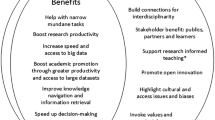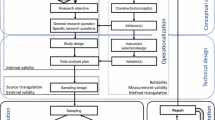Abstract
This study had three objectives: to examine patterns of research collaboration in Ghana, to study reasons why Ghanaian-affiliated researchers collaborate with others (both inside and outside Ghana), and to determine the roles of Ghanaian-affiliated researchers in collaborations. The methodology comprised a bibliometric analysis of articles in the Web of Science for the years 1990 to 2013, and an online survey of 190 Ghanaian-affiliated corresponding authors of articles. Collaboration increased from 73% in 1990–1997 to 93% in 2006–2013, and international collaboration from 49 to 73% over the same time. The public university and government sectors, together with the three most research-productive organisations in each sector, were found to be highly dependent on collaboration for research production. The online survey revealed that collaboration with researchers in three regions (within Ghana, within the rest of Africa, and outside Africa) was to a large extent initiated by existing personal/working relationships. Access to expertise and enhanced productivity were the main reasons why Ghanaian-affiliated researchers collaborated with others in these three regions. Collaborators within Ghana were largely involved in the collection of data or fieldwork. Collaborators from outside Africa played instrumental roles in providing resources and securing research funds.






Similar content being viewed by others
References
Abbassi, A., Liaquat, H., & Leydesdorff, L. (2012). Between centrality as a driver of preferential attachment in the evolution of research collaboration networks. Journal of Informetrics, 6(3), 403–412.
Adams, J., King, C., & Hook, D. (2010). Global research report: Africa. Leeds: Thomson Reuters.
AU–NEPAD (African Union–New Partnership for Africa’s Development). (2010). African innovation outlook 2010. Pretoria: AU–NEPAD.
Boshoff, N. (2009). Neo-colonialism and research collaboration in Central Africa. Scientometrics, 81(2), 413–434.
Boshoff, N. (2010). South-South research collaboration of countries in the Southern African Development Community (SADC). Scientometrics, 84(2), 481–503.
Bozeman, B., Fay, D., & Slade, C. P. (2013). Research collaboration in universities and academic entrepreneurship: The-state-of-the-art. Journal of Technology Transfer, 38, 1–67.
Confraria, H., & Godinho, M. M. (2015). The impact of African science: A bibliometric analysis. Scientometrics, 102, 1241–1268.
Essegby, G. O. (2013). Funding of STI: The Ghana experience. Presentation given at the Consultative Workshop on Science Granting Councils in Sub-Saharan Africa, 26–27 Nov 2013, Somerset West.
Gaillard, J. F. (1994). North-South research partnerships: Is collaboration possible between unequal partners? Knowledge and Policy, 7(2), 31–63.
Gaillard, J., Krishna, V. V., & Waast, R. (1997). Scientific communities in the developing world. New Delhi: Sage India.
Katz, J., & Martin, B. (1997). What is research collaboration? Research Policy, 26(1), 1–18.
Mêgnigbêto, E. (2013a). International collaboration in scientific publishing: The case of West Africa (2001–2010). Scientometrics, 96(3), 761–783.
Mêgnigbêto, E. (2013b). Scientific publishing in West Africa: Comparing Benin with Ghana and Senegal. Scientometrics, 95(3), 1113–1139.
MEST. (2010). National science, technology and innovation policy. Ministry of Environment, Science and Technology of the Republic of Ghana. http://mesti.gov.gh/wp-content/uploads/2014/02/National-STI-Policy.pdf. Accessed 19 Apr 2016.
Mouton, J. (2007). Study on national research systems: A meta-review. Regional report on sub-Saharan Africa. UNESCO Forum on Higher Education, Research and Knowledge. http://unesdoc.unesco.org/images/0015/001577/157797e.pdf. Accessed 19 Apr 2016.
Mouton, J. (2008). Africa’s science decline. Harvard International Review. http://hir.harvard.edu/global-educationafricas-science-decline/. Accessed 19 Apr 2016.
Moyi Okwaru, F., & Geissler, P. W. (2015). In/dependent collaborations: Perceptions and experiences of African scientists in transnational HIV research. Medical Anthropology Quarterly, 29(4), 492–511.
Onyancha, O. B., & Maluleka, J. R. (2011). Knowledge production through collaborative research in sub-Saharan Africa: How much do countries contribute to each other’s knowledge output and citation impact? Scientometrics, 87(2), 315–336.
Ordóñez-Matamoros, G., Cozzens, S. E., & García-Luque, M. (2011). North-South and South-South research collaboration: What differences does it make for developing countries?—The case of Colombia. Paper presented at the 2011 Atlanta Conference on Science and Innovation Policy, 15–17 Sept 2011, Atlanta, Georgia, USA. https://smartech.gatech.edu/bitstream/handle/1853/42488/457-1548-2-PB.pdf. Accessed 2 Sept 2016.
Pius, T. (2014). Sources of funding for higher education in Ghana. Master thesis produced by the Department of Education, University of Oslo, Norway. https://www.duo.uio.no/bitstream/handle/10852/41689/Twene-Pius-Thesis.pdf?sequence=1. Accessed 2 Sept 2016.
Ponds, R. (2009). The limits to internationalization of scientific research collaboration. Journal of Technology Transfer, 34, 76–94.
Pouris, A., & Pouris, A. (2009). The state of science and technology in Africa (2000–2004): A scientometric assessment. Scientometrics, 79(2), 297–309.
Schubert, T., & Sooryamoorthy, R. (2010). Can the centre-periphery model explain patterns of international scientific collaboration among threshold and industrialized countries? The case of South Africa and Germany. Scientometrics, 83(1), 181–203.
Sooryamoorthy, R. (2010). Science and scientific collaboration in South Africa: Apartheid and after. Scientometrics, 84(2), 373–390.
Tijssen, R. J. W. (2007). Africa’s contribution to the worldwide research literature: New analytical perspectives, trends, and performance indicators. Scientometrics, 71(2), 303–327.
Toivanen, H., & Ponomariov, B. (2011). African regional innovations systems: Bibliometric analysis of research collaboration patterns 2005–2009. Scientometrics, 88(2), 471–493.
UIS (2005). What do bibliometric indicators tell us about world scientific output? UIS Bulletin on Science and Technology Statistics, (2). http://www.csiic.ca/PDF/UIS_bulletin_sept2005_EN.pdf. Accessed 19 Apr 2016.
UNCTAD (2011). Science, technology and innovation policy review—Ghana. Report produced by the United Nations Conference on Trade and Development. http://unctad.org/en/Docs/dtlstict20098_en.pdf. Accessed 19 Apr 2016.
UWN (2014). Government prioritises research but lacks resources. University World News, Issue 303, 17 Jan 2014. http://www.universityworldnews.com/article.php?story=2014011712512921. Accessed 19 Apr 2016.
Wagner, C., & Leydesdorff, L. (2005). Mapping the network of global science: Comparing international co-authorships from 1990 to 2000. International Journal of Technology and Globalisation, 1(2), 185–208.
Acknowledgements
This research was funded with support from the Development Research Uptake in Sub-Saharan Africa (DRUSSA) programme. The DRUSSA programme is funded by the Department for International Development (DfID), which is a United Kingdom government department responsible for administering overseas aid. The authors also thank the two anonymous reviewers for their helpful and constructive comments, which greatly contributed to improving the final version of the article.
Author information
Authors and Affiliations
Corresponding author
Rights and permissions
About this article
Cite this article
Owusu-Nimo, F., Boshoff, N. Research collaboration in Ghana: patterns, motives and roles. Scientometrics 110, 1099–1121 (2017). https://doi.org/10.1007/s11192-016-2221-x
Received:
Published:
Issue Date:
DOI: https://doi.org/10.1007/s11192-016-2221-x




